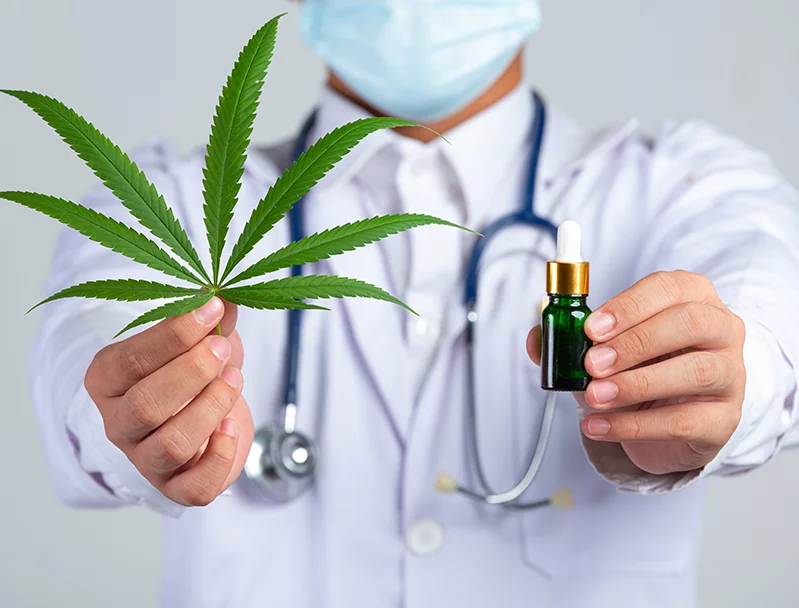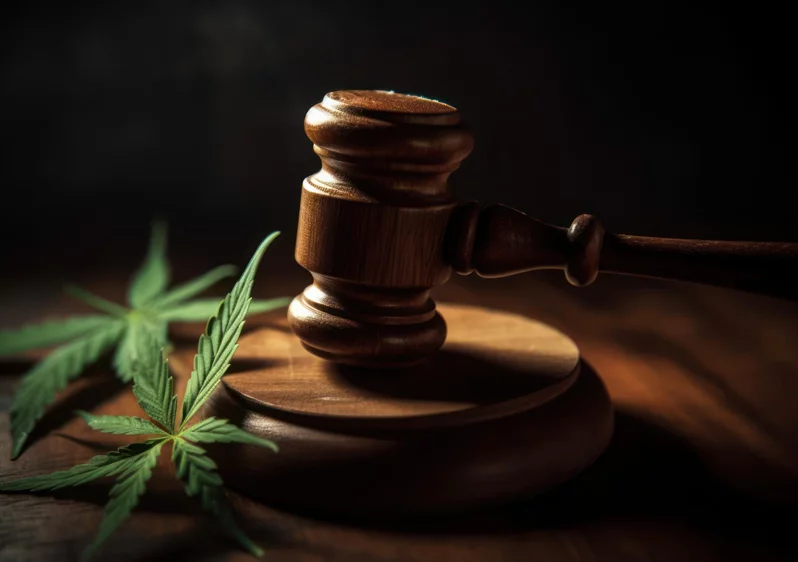CBD is one of at least 113 known cannabinoids derived from the hemp plant. These plant-based cannabinoids are similar in structure to the body’s own cannabinoid system, called the endocannabinoid system.
The endocannabinoid system in the body is responsible for regulating sleep, appetite, anxiety, and pain. CBD binds to part of the body’s endocannabinoid receptors to boost the body’s production of its own cannabinoids.
The specific cannabinoid substance found in marijuana that makes you high is called THC – the psychoactive part of the drug. Industrial hemp production is grown to have significantly lower THC levels and higher CBD yields.
In the UK, THC is highly-regulated to ensure there is no more than 1mg of THC per bottle of product, and therefore it will not induce psychoactive effects.
As long as you buy from a reputed supplier who can produce certification of the CBD products’ safety and ingredients it should be safe.
A World Health Organisation report on CBD confirmed that “CBD is generally well tolerated with a good safety profile. Reported adverse effects may be as a result of drug interactions between CBD and patients’ existing medications.”
Controlled human studies have not found any potential for physical dependence, withdrawal, or tolerance. Due to the extremely low levels of THC, there’s no reason why CBD oil should be addictive when used responsibly.
Not all CBD products are the same quality so it’s important to look out for trusted brands who can provide analytical results for their products. Any company that makes a CBD product should be able to supply a consumer with a certificate confirming its safety, the amount of THC it contains, and any residual solvents leftover from the manufacturing process.
It’s always best to stick to the manufacturer’s instructions on the product purchased but if you notice any adverse effects such as dry mouth, low blood pressure, and drowsiness, discontinue use and consult your GP.
Most CBD products that are available in the UK come from industrial hemp grown within the European Union, adhering to strict guidelines.
There are three ways CBD oil can be extracted from the hemp plant. Firstly, and most commonly, ethanol is used to extract CBD from hemp. Alternatively, carbon dioxide is used to heat up the hemp and the resulting oil is then extracted – this is called ‘supercritical Co2 extraction’.
At BetterYou, we are currently investigating the method of extracting CBD oil using water, but it may be a while before this is commercially available.
The effects of CBD oil will vary from person to person. With an oral spray or dropper, the effects are usually noticed within 30 minutes to an hour and can last up to six hours, depending on the dose administered.
It’s important to start with a lower dose and build up to a comfortable level that is right for you.
We know that delivery via an oral spray can be much more effective as it delivers nutrients directly into the bloodstream, bypassing the digestive system where absorption can be lost or may vary from person to person.
“Full-spectrum” or “whole-plant” CBD oil will contain trace amounts of THC as well as other cannabinoids. This contributes to the much-touted “entourage effect,” which Dr. Joseph Nathan, Director of the International Drug Information Center, notes allows users to reap the benefits of not only the hundreds of cannabinoids but also the flavonoids and terpenes present in the plant.
Isolate CBD oils are made by isolating only the CBD present in the plant; THC and other cannabinoids will not be present in these oils.
Hemp oil is the name given to any oil derived from the hemp plant; CBD oil is an oil containing high amounts of CBD, made from either the hemp or the cannabis plant. While much CBD oil is also hemp oil, not all hemp oil is CBD oil; hemp oil made from the seeds of the hemp plant will not contain active CBD.
Hemp seed oil is made from the seeds of the hemp plant that are rich in omega 3 and 6 fatty acids – they tend to be used in cooking and cosmetics.
Hemp seeds are a portion of food, but when you start growing the plant and extracting CBD oil from its leaves and stalks, then you’re talking about a CBD oil supplement, and the manufacture of these is strictly regulated in the UK.
CBD oil can also be known as ‘hemp extract’ and is derived from the industrial hemp process that results in high CBD and lower THC-containing crops – this is what you find in CBD oil supplements.
Clinical trials are still confirming the efficacy of CBD oil, but many individuals have noted that it has a positive effect on their health and well-being.
Claims have surfaced pointing to the possibility that CBD is more effective when taken in a 1:1 ratio with THC; this contributes to rumors that CBD oil produced from industrial hemp is less effective than CBD oil produced from cannabis.
Studies have shown that CBD and THC may well have a synergistic effect, for example in one study with cancer patients.. The issue, however, lies in the legality and psychoactive properties of THC.

“The better question would be, ‘can I take THC with my CBD and take advantage of the synergy, or do I have to forgo THC because I can’t be high right now?’” explains Steve Looi, Director of Origination at White Sheep Corp., a Toronto-based cannabis commercial operator and strategic investor with holdings in Canada and the US. “In the end, it’s likely a case of taking them together when you can and CBD alone when you have to.”
If you cannot take a 1:1 THC to CBD product, then you may actually be better off opting for a full-spectrum oil made from industrial hemp, which is naturally low in THC but boasts other cannabinoids and compounds.
“Much of the data that we have on cannabinoids refers generally to cannabinoids as a general concept, as opposed to specifically CBD or THC,” explains Dr. Nathan. “Therefore, it’s difficult to see, when you see a benefit of cannabis, whether it was the THC, the CBD, a combination of the THC and CBD… or a combination of THC plus CBD plus any of the other 100 or more cannabinoids that are available in the plant.”
“I tend to think that in most plants, nature evolves them to be the ideal expressions of that particular plant,” says Chris Kilham, Medicine Hunter. “So I think that there’s almost always a case to be made for using a whole plant.”

Yes! Most CBD oil is produced from industrial hemp, the same plant used to make hemp textiles and hemp seeds. This plant contains trace amounts of psychoactive THC – not enough to make you high and usually not even enough to make you fail a drug test.
The trace amounts of THC in full-spectrum oils should not make you fail a drug test, but some trustworthy companies, such as PlentyPharma, provide solutions completely devoid of THC for those for whom random drug testing is a concern.

Technically speaking, yes: extracts of all plants from the cannabis genus were made schedule 1 drugs in early 2017. That said, the 2014 Farm Bill allows the cultivation and sale of hemp containing less than .3 percent THC, which includes hemp oil made from industrial hemp.
It’s interesting to note that the FDA recently approved Epidiolex, a CBD-based epilepsy drug from GW Pharmaceuticals. This approval may have an effect on CBD’s scheduling status.
“An approval might even mean that the Drug Enforcement Agency (DEA) would have to reschedule the specific marijuana component in the drug, CBD, because it will have proven to have a tangible medical benefit,” writes Fortune.
